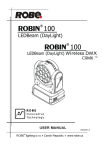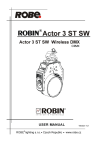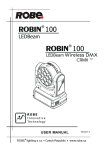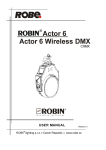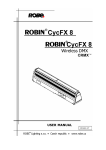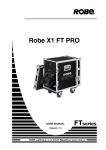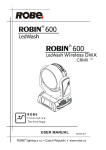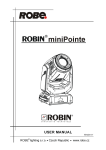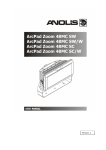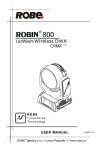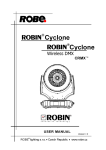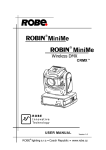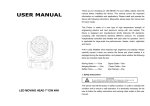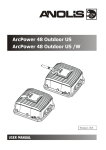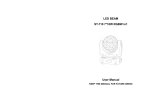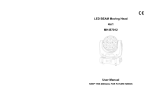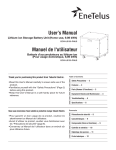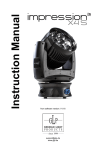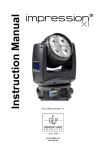Download "user manual"
Transcript
Version1.2
Version 1.0
Robin 100 LEDBeam (SmartWhite)
Robin 100 LEDBeam (SmartWhite)
Wireless DMX
Table of contents
1. Safety instructions.......................................................................................................... 3
2. Fixture exterior view ...................................................................................................... 5
3. Installation....................................................................................................................... 6
3.1 Connection to the mains............................................................................................. 6
3.2 Installing the top hat.................................................................................................... 7
3.3 Installing the diffusion filter.......................................................................................... 8
3.4 Rigging the fixture....................................................................................................... 9
3.5 DMX-512 connection................................................................................................. 11
3.6. Wireless DMX operation.......................................................................................... 12
4. Control menu map......................................................................................................... 13
5.Robin 100 LEDBeam SmartWhite - DMX chart............................................................ 15
5.1 LED zone order......................................................................................................... 18
6. Control menu ................................................................................................................ 19
6.1 Addressing (DMXA).................................................................................................. 19
6.2 Fixture information (Info)........................................................................................... 19
6.3 Personality (Pers)...................................................................................................... 20
6.4 Manual Control (Manual)........................................................................................... 20
6.5 Test program (Test Prg)............................................................................................ 21
6.6 Stand-alone (St Alone).............................................................................................. 21
6.7 Reset......................................................................................................................... 21
6.8 Special functions (Special)........................................................................................ 21
7. RDM................................................................................................................................ 23
8. Error and information messages................................................................................. 23
9. Technical Specifications.............................................................................................. 24
10. ChangeLog . ................................................................................................................ 26
11. Maintenance and cleaning.......................................................................................... 26
11.1 Replacing fuse........................................................................................................ 27
12. Photometric diagrams................................................................................................ 28
FOR YOUR OWN SAFETY, PLEASE READ THIS USER MANUAL CAREFULLY
BEFORE POWERING OR INSTALLING YOUR ROBIN 100 LEDBeam !
Save it for future reference.
This device has left our premises in absolutely perfect condition. In order to maintain this condition and to
ensure a safe operation, it is absolutely necessary for the user to follow the safety instructions and warning
notes written in this manual.
The manufacturer will not accept liability for any resulting damages caused by the non-observance of this
manual or any unauthorized modification to the device.
Please consider that damages caused by manual modifications to the device are not subject to warranty.
The Robin 100 LEDBeam was designed for indoor use and it is intended for
professional application only. It is not for household use.
1. Safety instructions
DANGEROUS VOLTAGE CONSTITUTING A RISK OF ELECTRIC SHOCK IS PRESENT WITHIN THIS
UNIT!
Make sure that the available voltage is not higher than stated on the rear panel of the fixture.
This fixture should be operated only from the type of power source indicated on the marking label. If you are
not sure of the type of power supplied, consult your authorized distributor or local power company.
Always disconnect the fixture from AC power before cleaning, removing or installing the fuses, or any part.
The power plug has to be accessible after installing the fixture. Do not overload wall outlets and extension cords
as this canresult in fire or electric shock.
Do not allow anything to rest on the power cord. Do not locate this fixture where the cord may be damaged by
persons walking on it.
Make sure that the power cord is never crimped or damaged by sharp edges. Check the fixture and the power
cord from time to time.
Refer servicing to qualified service personnel.
This fixture falls under protection class I. Therefore this fixture has to be connected to
a mains socket outlet with a protective earthing connection.
Do not connect this fixture to a dimmer pack.
LED light emission. Risk of eye injury. Do not look into the beam at a distance of less
than 2 meters from the front surface of the product. Do not view the light output with
optical instruments or any device that may conncentrate the beam
If the fixture has been exposed to drastic temperature fluctuation (e.g. after transportation), do not switch it on
immediately. The arising condensation water might damage your device. Leave the device switched off until
it has reached room temperature.
Do not shake the fixture. Avoid brute force when installing or operating the fixture.
This fixture was designed for indoor use only, do not expose this unit to rain or use near water.
When choosing the installation spot, please make sure that the fixture is not exposed to extreme heat, moisture
or dust.
Air vents and slots in the fixture´s head and base are provided for ventilation, to ensure reliable operation of
the device and to protect it from overheating.
Do not block the LEDs array with any object when the fixture is under operation.
The openings should never be covered with cloth or other materials, and never must be blocked.
This fixture should not be placed in a built-in installation unless proper ventilation is provided.
Only operate the fixture after having checked that the housing is firmly closed and all screws are tightly fastened.
Always use a secondary safety cable when mounting this fixture.
Make sure that the area below the installation place is blocked when rigging, derigging or servicing the fixture.
Do not block the front objective LEDs with any object when the fixture is under operation.
The fixture becomes very hot during operation. Allow the fixture to cool approximately 20 minutes prior to
manipulate with it.
Operate the fixture only after having familiarized with its functions. Do not permit operation by persons not
qualified for operating the fixture. Most damages are the result of unprofessional operation!
Please use the original packaging if the fixture is to be transported.
Please consider that unauthorized modifications on the fixture are forbidden due to safety reasons!
If this device will be operated in any way different to the one described in this manual, the product may suffer
damages and the guarantee becomes void. Furthermore, any other operation may lead to dangers like shortcircuit, burns, electric shock, crash etc.
2. Fixture exterior view
1 - Moving head
2 - Attachment point for safety cable
3 - Base
4 - Yoke
5 - DMX out
6 - DMX in
7 - Control board
8 - Mains in
9 - Mains out
3. Installation
Fixtures must be installed by a Qualified electrician in accordance with all
national and local electrical and construction codes and regulation.
3.1 Connection to the mains
For protection from electric shock, the fixture must be earthed!
The Robin 100 LEDBeam is equipped with auto-switching power supply that automatically adjusts to any 5060Hz AC power source from 100-240 Volts.
If you need to install a suitable plug on the power cord, note that the cores in the power cord are coloured according to the following table. The earth has to be connected!
If you have any doubts about proper installation, consult a qualified electrician.
Core (EU)
Core (US)
Connection
Plug Terminal Marking
Brown
Black
Live L
Light blue
White
Neutral
N
Yellow/Green
Green
Earth
This device falls under class one and must be earthed (grounded)!
Design of the Robin 100 LEDBeam allows to connect several fixtures to AC mains power in one interconnected
daisy chain using power input and throughput connectors. Needed daisy chain cords are stated in the chapter
“Technical specifications “
The max. number of connected fixtures depends on the AC mains power voltage:
12 fixtures at power supply= 230V
10 fixtures at power supply= 208V
6 fixtures at power supply= 120V
Do not overload the supply line and the connecting leads.
Wiring and connection work must be carried out by qualified staff!
3.2 Installing the top hat
Disconnect the fixture from mains before top hat installation
1. Go to the fixture menu and limit tilt movement (Pers --> Tilt Red--> On).
2.Put the top hat (1) on the head of the fixture (3) in such a way that both clips (2) of the top hat snap into cavities (4) in the head. Check that both clips are firmly egaged in the head cavities.
3.3 Installing the diffusion filter
Disconnect the fixture from mains before diffusion filter installation
1. nsert two screws (1) into holder with diffusion filter (2) and secure them with securing washers (3).
2.Screw the holder (3) to the head via two screws (1).
3.4 Rigging the fixture
The installation of the fixture has to be built and constructed in a way that it can hold 10 times the weight for 1
hour without any harming deformation.
The installation must always be secured with a secondary safety attachment, e.g. an appropriate catch net.
This secondary safety attachment must be constructed in a way that no part of the installation can fall down if
the main attachment fails.
When rigging, derigging or servicing the fixture staying in the area below the installation place, on bridges,
under high working places and other endangered areas is forbidden.
The operator has to make sure that safety-relating and machine-technical installations are approved by an expert
before taking into operation for the first time and after changes before taking into operation another time.
The operator has to make sure that safety-relating and machine-technical installations are approved by an
expert after every four year in the course of an acceptance test.
The operator has to make sure that safety-relating and machine-technical installations are approved by a skilled
person once a year.
The fixture should be installed outside areas where persons may walk by or be seated.
IMPORTANT! OVERHEAD RIGGING REQUIRES EXTENSIVE EXPERIENCE, including (but not limited to)
calculating working load limits, installation material being used, and periodic safety inspection of all installation
material and the projector. If you lack these qualifications, do not attempt the installation yourself, but instead
use a professional structural rigger. Improper installation can result in bodily injury or damage to property.
The fixture has to be installed out of the reach of people.
If the fixture shall be lowered from the ceiling or high joists, professional trussing systems have to be used. The
fixture must never be fixed swinging freely in the room.
Caution: Fixture may cause severe injuries when crashing down! If you have doubts concerning the safety of
a possible installation, do not install the moving head!
Before rigging make sure that the installation area can hold a minimum point load of 10 times the fixture’s
weight.
When installing the device, make sure there is no highly inflammable
material (decoration articles, etc.) in a distance of min. 0.4 m.
.
CAUTION!
Use an appropriate clamp to rig the fixture on the truss.
Follow the instructions mentioned at the bottom of the base.
Make sure that the device is fixed properly! Ensure that the
structure (truss) to which you are attaching the fixtures is secure.
The fixture can be placed directly on the stage floor or rigged on a truss without altering its operation characte
ristics .
For securing a fixture to the truss install a safety wire that can hold at least 10 times the weight of the fixture.
Use only safety wire with screw-on carabine. Fasten the safety cable in the attachment point and around
the truss as shown on the picture below.
Rigging via omega holder:
1-Omega holder
2-Clamp
3-Trust
4-Attachment point
5-Safety chain
When installing fixtures side-by-side, avoid illuminating one fixture with
another!
10
3.5 DMX-512 connection
The fixture is equipped with 5-pin XLR sockets for DMX input and output. Only use a shielded twisted-pair
cable designed for RS-485 and 5-pin XLR-plugs and connectors in order to connect the controller with the
fixture or one fixture with another.
DMX output
XLR socket:
DMX input
XLR plug:
1 - Shield
2 - Signal (-)
3 - Signal (+)
4 - Used for wireless DMX
5 - Used for wireless DMX
1 - Shield
2 - Signal (-)
3 - Signal (+)
4 - Used for wireless DMX
5 - Used for wireless DMX
If you are using the standard DMX controllers, you can connect the DMX output of the controller directly with
the DMX input of the first fixture in the DMX-chain. If you wish to connect DMX-controllers with other XLR-outputs, you need to use adapter-cables.
Building a serial DMX-chain:
Connect the DMX-output of the first fixture in the DMX-chain with the DMX-input of the next fixture. Always
connect one output with the input of the next fixture until all fixtures are connected. Up to 32 fixtures can be
interconnected.
Caution: At the last fixture, the DMX-cable has to be terminated with a terminator. Solder a 120 Ω resistor
between Signal (–) and Signal (+) into a 5-pin XLR-plug and plug it in the DMX-output of the last fixture.
11
3.6. Wireless DMX operation
The external Robe Wireless CRMX-LB100 module allows receiving wireless DMX This device is equipped
with the Lumen Radio CRMX module and antenna for receiving DMX signal. CRMX module operates on the
2.4 GHz band.
Robe Wireless CRMX-LB100
1 - 5-pin XLR (female)
2 - Locating pin
3 - Lock
Push in the 5-pin XLR plug (1) into 5-pin XLR sockit (4) and simultaneously locating pin (2) into hole (5) in the
fixture. In this way the wireless DMX module is connected with the fixture.
NOTE: when you disconnect the DMX wireless module from fixture, press and hold lock (5) during getting the
wireless module out.
To link the fixture with DMX transmitter.
The fixture can be only linked with the transmitter by running the link procedure at DMX transmitter .
After linking , the level of DMX signal ( 0-100 %) is displayed in the menu item “Stat“ (Special -->Vireless ->Stat).
To unlink the fixture from DMX transmitter.
The fixture can be unlinked from receiver via the menu item “ Unlink“ (Special-->Vireless -->Unlink.).
Note:Wireless DMX operation is implemented in the processor IC-1 (Info -->Sw Ver). Version of this processor
has to be following:
IC-1 = 2.2 and higher for RGBW version
IC-1 = 1.2 and higher for SmartWhite and Day Light version.
12
4. Control menu map
Default settings=Bold print
Level 1
Level 2
Level 3
DMXA
Set DMXA
001-255
Info
POn Time
Total
Level 4
Reset
DMX In
Pan
0-255
:
Dimm F
Temp
0-255
Current
Highest
High Res
Sw Ver
IC-1
IC-2
IC-3
Pers
DMX Pres
Mode 1
:
Mode 6
Pan Rev
On, Off
Tilt Rev
On, Off
P/T Mode
Speed
Time
P/T Feed
On, Off
Tilt Red
On, Off
Display
Turn
On/Off T
On, Off
Contrast
0-100%
Backlight
0-100%
BLC DMC
On, Off
Act BLC
P/T Mov
Mic Sens
0...10...19
Fans
Auto, High
Temp Uni
°C, °F
I Ef Pos
Pan
On, Off
:
Dimm F
Store
Defaults
Test Prg
Static
Pan
0-255
Tilt
0-255
Run
Dynamic
Manual
Pres Eff
Pan
Pos 1-Pos 3
:
Manual
Dimmer
Pos 1- Pos 5
Pan
0-255
:
Dimm F
0-255
13
Level 5
Level 6
Level 7
Level 1
Level 2
Level 3
Sta Alone
Music T
On, Off
Level 4
Level 5
Auti Run
Off
Level 6
Prog 1
Step 1
Pan
Prog 2
:
:
Prog 3
Step 40
F.Tim
0-25.5
S.Tim
0-25.5
Test
Prog 1
Prog 2
Prog 3
Pr Play
Test Prg
Prog 1
Prog 2
Prog 3
Pr Edit
COPY
Prg End
Reset
Special
RDM Low
RDM Hight
Wireless
Stat
Unlink
Adjust
DMX Val
Pan
0-255
:
Calib
Dimm F
0-255
Pan C
0-255
Tilt C
0-255
Store
Sw Upd
On, Off
14
1-40
Level 7
5.Robin 100 LEDBeam SmartWhite - DMX chart
Version 1.0
Mode/Channel
Value
Function
Type of control
1
2
3
4
5
6
1
1
1
1
1
1
0-255
Pan (8 bit)
Pan movement by 450°
proportional
2
2
2
2
2
2
0-255
Pan Fine (16 bit)
Fine control of pan movement
proportional
3
3
3
3
3
3
0-255
Tilt (8bit)
Tilt movement by 300°
proportional
4
4
4
4
4
4
0-255
Tilt fine (16 bit)
Fine control of tilt movement
proportional
0
5
5
5
5
5
5
6
6
6
6
6
P./T. speed-set Speed Mode in menu: P./T. Mode
step
1 - 255
Speed from max. to min. (vector mode)
proportional
1 - 255
Time from 0.1 s to 25.5 s.
proportional
0-9
6
Pan/Tilt speed, Pan/Tilt time
Max. speed (tracking mode)
10 - 49
50 - 59
60 - 69
70 - 79
80 - 89
90 - 119
120-124
125-129
130-139
140 - 149
150 - 199
200 - 209
210 - 255
P./T. time - set Time Mode in menu: Pan/Tilt Mode
Special functions
Reserved
To activate following functions , stop in DMX value
for at least 3sec. and shutter must be closed at least
3sec. (Shutter channel 20/12/10/8/7/22 must be at
range of 0-31DMX). Corresponding menu items are
temporily overrided.
Reserved
Pan/Tilt speed mode
Pan/Tilt time mode
Blackout while pan/tilt moving
Disabled blackout while pan/tilt moving
Reserved
Tilt movement reduction On
Tilt movement reduction Off
Reserved
To activate following reset function, stop in DMX
value for at least 3 sec.
Pan/Tilt reset
Reserved
Total reset
Reserved
step
step
step
step
step
step
step
step
-
7
7
-
-
-
0-255
Warm White (8 bit) - all zones
Warm white LEDs saturation control (0-100%)
proportional
-
8
-
-
-
-
0-255
Warm White(16 bit) - all zones
Fine warm white LEDs saturation control
proportional
-
9
8
-
-
-
0-255
Cool White (8 bit) - all zones
Cool white LEDs saturation control (0-100%)
proportional
-
10
-
-
-
-
0-255
Cool white fine (16 bit) - all zones
Fine cool white LEDs saturation control
proportional
proportional
7
-
-
-
11
7
0-255
Warm White (8 bit) - zone 1
Warm white LEDs saturation control (0-100%)
8
-
-
-
12
8
0-255
Warm white fine (16 bit) - zone 1
Fine warm white LEDs saturation control
proportional
9
-
-
-
13
9
0-255
Cool white (8 bit) - zone 1
Cool white LEDs saturation control (0-100%)
proportional
10
-
-
-
14 10
0-255
Cool white fine (16 bit) - zone 1
Fine cool white LEDs saturation control
proportional
15
Mode/Channel
6
Value
Function
Type of control
1
2
3
4
5
11
-
-
-
15 11
0-255
Warm White (8 bit) - zone 2
Warm white LEDs saturation control (0-100%)
proportional
12
-
-
-
16 12
0-255
Warm white fine (16 bit) - zone 2
Fine warm white LEDs saturation control
proportional
13
-
-
-
17 13
0-255
Cool white (8 bit) - zone 2
Cool white LEDs saturation control (0-100%)
proportional
14
-
-
-
18 14
0-255
Cool white fine (16 bit) - zone 2
Fine cool white LEDs saturation control
proportional
proportional
15
-
-
-
19 15
0-255
Warm White (8 bit) - zone 3
Warm white LEDs saturation control (0-100%)
16
-
-
-
20 16
0-255
Warm white fine (16 bit) - zone 3
Fine warm white LEDs saturation control
proportional
17
-
-
-
21 17
0-255
Cool white (8 bit) - zone 3
Cool white LEDs saturation control (0-100%)
proportional
18
-
-
-
22 18
0-255
Cool white fine (16 bit) - zone 3
Fine cool white LEDs saturation control
proportional
10 19
0
1-2
3-4
5-6
7-8
9-10
11-12
13-14
15-16
17-247
19 11
9
7
248
249
250
251
252
253
254
255
-
-
-
-
-
8
7
22
step
step
step
step
step
step
step
step
step
proportional
step
step
step
step
step
step
step
step
Reserved
20
21
Reserved)
0-31
32-63
64-95
20 12 10
Virtual colour wheel & zone effects
No function
White 2800 K
White 3200 K
White 3800 K
White 4200 K
White 4600 K
White 5000 K
White 5600 K
White 6300 K
Warm white --> Cool white
Speed of the following effects can be controlled by the
Shutter/Strobe channel (DMX values of 96-127)
Rainbow effect (with fade time)
Rainbow effect
Zone effect 1
Zone effect 2
Zone effect 3
Zone effect 4
Zone effect 5
Zone effect 6
96-111
112-127
128-143
144-159
160-175
Shutter/Strobe
Shutter closed
Strobe effect from slow--> fast (zone 2 and 3 only)
Strobe effect from slow--> fast (All zones together)
--------------Set value on Virtual colour wheel--------------
Zone effects speed control, slow--> fast
Zone effects speed control, fast--> slow /opposite direction/
Opening pulses in sequences from slow--> fast
(All zones together)
Closing pulses in sequences from fast--> slow
(All zones together)
Random strobe effect from slow--> fast (random zone)
16
step
proportional
proportional
proportional
proportional
proportional
proportional
proportional
Mode/Channel
1
2
3
20 12 10
4
8
5
7
6
22
Value
Function
Type of control
176-191
Random strobe effect from slow--> fast (random zone +
random strobe)
proportional
192-223
224-255
Random strobe effect from slow --> fast (All zones
together)
Shutter open
proportional
step
21 13 11
9
8
23
0-255
Dimmer (8 bit)
Dimmer intensity from 0% to 100%
proportional
22 14
-
9
24
0-255
Dimmer fine (16 bit)
Fine dimming
proportional
-
17
5.1 LED zone order
18
6. Control menu
The Robin 100 LEDBeam is equipped with 2-row LCD display which allows to set the fixture´s behaviour according to your needs, obtain information on its operation, test its various parts and lastly program it, if it has
to be used in a stand-alone mode.
Control panel:
[ESCAPE] button used to leave the menu without saving changes.
[NEXT] , [PREV] buttons for moving between menu items and for value adjusting.
[ENTER] button used to enter the selected menu (menu item) and to confirm adjusted value.
After switching the fixture on, display shows current DMX address.
6.1 Addressing (DMXA)
Set DMXA- Use this menu item to set the DMX start address of the fixture, which is defined as the first channel
from which the Robin 100 LEDBeam will respond to the controller.
If you set, for example, the address 36, the Robin 100 LEDBeam will use channels 36 - 57 for control (if Mode
1 is selected).
Please, be sure that you do not have any overlapping channels in order to control each Robin 100 LEDBeam
correctly and independently from any other fixture on the DMX data link.
If there is no data received at the DMX input, the display will start to flash "0001” with actually stored DMX
address.
6.2 Fixture information (Info)
Pon Time - Power on time. Select this menu to read the number of fixture operation hours.
Total - The item shows the total number of the operation hours since
the Robin 100 LEDBeam has been fabricated.
Reset - The item shows the number of the operation hours that the Robin 100 LEDBeam has been powered on since the counter was last reset.
In order to reset this counter to 0, press and hold both [NEXT] and [PREV] buttons and the [Enter] button at the same time.
DMX In - DMX readout. The menu is used to read DMX values of each channel received by the fixture.
Temp - Temperature. The menu shows temperature in the LED module.
Current - A current temperature of the LED module.
Highest - A maximum temperature of the the LED module since the fixture has
been fabricated.
High Res - A maximum temperature of the the LED module since the counter
was last reset.
In order to reset this counter, press and hold both [NEXT] and [PREV] buttons and the [Enter] button at the same time.
Sw Ver - Software versions. Select this item to read the software version of the fixture modules.
IC-1 - A pan/Tilt processor on the main board in the fixture arm.
IC-2 - A display processor on the display board in the fixture base.
IC-3 - LED control processor on the board in the fixture head.
19
6.3 Personality (Pers)
DMX Pres - DMX preset. Use the menu to select desired channel mode.
Mode 1 - 22 control channels
Mode 2 - 14 control channels
Mode 3 - 11 control channels
Mode 4 - 9 control channels
Mode 5 - 22 control channels
Mode 6 - 24 control channels
Pan Rev - Pan reverse. The item allows to invert pan movement.
Tilt Rev - Tilt reverse. The item allows to invert tilt movement.
P/T Mode - Pan and Tilt movement mode. Use this menu to set mode of the pan/tilt movement.
Speed - Both Pan and tilt will move with the same speed as adjusted at the channel 5
"Pan/Tilt speed, Pan/Tilt time".
Time – The pan and tilt will move with different speeds and they will come at
the same time to the end point of their tracks (pan and tilt use their optimal speeds).
Time of the pan/tilt movement (25.5 sec. max.) is set by the channel "Pan/Tilt speed, Pan/Tilt
time".
P/T Feed - Pan and Tilt Feedback. The menu item allows to return the mowing head to the required pan/tilt
position after changing the position by an external force if this option is set on.
Note. The Pan/Tilt Feedback should be permanent On, the option Off is not suitable for standard operation and
the head of the fixture can be damaged!
Tilt Red - Tilt movement reduction. Use this menu to set the range of the tilt movement of the fixture head
Off – Standard range: 0-300°.
On- Reduced range: 0-210°. This option must be set before top hat placing otherwise the
top hat will ran into fixture´s yoke.
Display - Display adjusting. This menu allows you to adjust the display behaviour.
Turn - This function turns the display by 180°.
On/Off T - This function allows you to keep the display permanent on or turn it off two minutes
after last pressing any button on the control panel.
Contrast- Use this function to adjust contrast of the display (0-100%).
Backlight- Use this function to adjust backlight of the display (0-100%).
BLC DMC - Blackout during movement correction. Set this option on if you wish to close light
output during the time when the head goes to its correct position, which has been changed by an
external force.
Act Blc - Active blackout. Use this menu if you wish to close the light output during effect changes.
P/T Mov - The menu item allows to close light output while the pan/tilt coordinates
are changing.
Mic Sens - Microfon sensitivity. Enter the menu if you want to adjust the microphone sensitivity ( 1-max.,
19-min.).
Fans - Fan mode. Use the menu to set the fixture fans to max. fan power mode ("High") or to auto- control
mode ("Auto").
Temp Uni - Temperature unit. Use the menu item to change temperature unit from °C to °F.
I Ef Pos - Init effect positions. Use the menu to set all effects to the desired positions at which they will stay
after switching the fixture on without DMX signal connected.
Defaults - The menu item allows to set all fixture parameters to the default (factory) values.
6.4 Manual Control (Manual)
Pres Eff - Preset effects. Use the menu to show preset positions of each channel effect.
Manual C - Manual control. Use the menu to control all fixture channels by means of the control panel.
20
6.5 Test program (Test Prg)
Use this menu to to run a special demo-test sequences without an external controller, which will show you some
possibilities of using Robin 100 LEDBeam.
Static - Static mode. This mode is suitable for projections on the wall, ceiling or ground
without any head movement.
Dynamic - Dynamic mode. This mode uses all Robin 100 LEDBeam functions including pan/tilt movement and therefore is good for a complete introduction of the fixture.
6.6 Stand-alone (St Alone)
Music T - Music trigger. Select this function to enable the sound control of the running program via the built-in
microphone.
Auto Run - Presetting playback. This function allows you to select the program which will be played in the
stand-alone mode after switching the fixture on. Selected program will be played continuously in a loop.
Off - The option disables „Auto Run” function.
Test - The option will start built-in test program.
Prog 1 - The option will start user-created program 1
Prog 2 - The option will start user-created program 2
Prog 3 - The option will start user-created program 3
Pr Play - Playing program. Select this menu to run a user-created program in a loop.
Test Prg - The option runs built-in test program.
Prog 1 - The option runs user-created program 1
Prog 2 - The option runs user-created program 2
Prog 3 - The option runs user-created program 3
Select the program you wish and press [ENTER]. The selected program starts running. By Pressing [ENTER]
again, program pauses running.
Pr Edit - Editing program. Select this menu to edit or create the program. The Robin 100 LEDBeam has one
built-in program and one user-editable program up to 40 steps. Each program step has a step time - during
which effects last in the current step and a fade time- during which effects move to new positions.
To edit program:
Procedure:
1. Press [NEXT] or [PREV] to select the menu "Edit" and press [ENTER].
2. Press [NEXT] or [PREV] to select the desired program step and press [ENTER] button.
3. Press [NEXT] or [PREV] to select the desired item and press [ENTER] button. Now you can edit by [NEXT]
or [PREV] buttons the DMX value (0-255) for selected item:
Prg End. a total number of the program steps (value 1-40). This value you should be set before starting of programming (e.g. if you want to create program with the 10 steps,
set Prg End=10).
PAn
a coarse pan movement
PAn F
a fine pan movement
Tilt
a coarse tilt movement
Tilt F
a fine tilt movement
P/T Sp
a pan/tilt speed
Power
power/special functions
Strob a strobe/shutter
Dimmer
4 dimmer coarse F.Tim a fade time (0-25.5 sec)
Dimm F
a dimmer fine
S.Tim
a step time (0-25.5 sec)
COPY copying the current prog. step to
4. Press [ENTER] button to confirm adjusted value .
5. Press [ESCAPE] button, select next prog. step, press [ENTER] button and repeat steps 3 - 5).
6.7 Reset
This option enables the Robin 100 LEDBeam to index all effects and return to their standard positions.
6.8 Special functions (Special)
RDM Low - This menu item shows the first part of the RDM identification code.
21
RDM High - This menu item shows the second part of the RDM identification code.
Wireless - Wireless DMX information. The menu allows to read some information about
Wireless DMX operation
Stat - Wireless status. Use the menu to read wireless DMX status.
Unlink - use this item to unlink fixture from wireless DMX.
Adjust - Adjustment. The menu allows the fine adjustment of effects.
DMX Val- DMX values. Use the menu to set DMX values of fixture´s channels.
Calib - A fine calibration of pan/tilt
Calibration of the pan/tilt via the control board
1. Disconnect DMX controller from the fixture and enter the "Calib" menu.
2. Use the [PREV] and [NEXT] to find "Pan" and press [ENTER].
3. Set desired value and save it by pressing [ENTER].
4. Repeat steps 2 and 3 for Tilt.
5. After calibrating both effects, find item "Store" and press [ENTER]. to save all adjusted values and reset the
fixture.
Note: you can also use DMX controler for both calibrations stated above, calibration protocol is the following:
Effect
Mode 1
Mode 2
Mode 3
Mode 4
Mode 5
Pan-fine adjustment
channel 23
channel 15
channel 12
channel 10
channel 23
Tilt - fine adjustment
channel 24
channel 16
channel 13
channel 11
channel 24
Sw Upd - Software update. The menu item allows you to update software in the fixture via either serial or
USB port of PC.
The following are required in order to update software:
- PC running Windows 95/98/2000/XP/7 or Linux
- DMX Software Uploader
- Flash cable RS232/DMX No.13050624 (if you want to use a serial port of PC)
- Robe Universal Interface (if you want to use an USB port of PC)
Note 1: Software update should execute a qualified person. If you lack qualification, do not attempt the update
yourself and ask for help your ROBE distributor.
Note 2: DMX address, , programs 1-3 and all items in the menu "Pers" will be set to their default (factory)
values.
To update software in the fixture:
I. Installation of the DMX Software Uploader.
1. DMX Software Uploader program is available from the ROBE web site at WWW.robe.cz.
2. Make a new directory ( e.g. Robe_Uploader) on your hard disk and download the software to it.
3. Unpack the program to the directory.
II.Fixture software updating.
1.Determine which of your ports is available on your PC and connect it:
- with the DMX input of the fixture if you using the flash cable RS232/DMX
- with the DMX output of the Robe Universal Interface if you using the USB cable.
Disconnect the fixture from the other fixtures in a DMX chain. Turn both the computer and
the fixture on. Make sure the lamp is switched off (only if the fixture involves a lamp).
2. Switch the fixture to the updating mode by selecting the "SW Upd " item and press [ENTER].
Note: If you do not want to continue in software update, you have to switch off and on the fixture
to escape from this menu.
We recommend to cancel all running programs before starting the Software Uploader.
3. Run the Software Uploader program. Select desired COM and then click on the Connect button.
(Select COM if the serial port is used or Robe Universal Interface if the USB port is used).
If the connection is OK, click on the “Start Uploading button“ to start uploading. It will take several
minutes to perform software update.
If the option "Incremental Update" is not checked, all processors will be updated (including
processors with the same software version).
If you wish to update only later versions of processors, check the “Incremental Update box“.
Avoid interrupting the process. Update status is being displayed in the Info Box window.
22
When the update is finished, the line with the text “The fixture is successfully updated“ will appear in
this window and the fixture will reset with the new software.
Note: In the case of an interruption of the upload process (e.g. power cut), the fixture keeps the updating mode
and you have to repeat the software update again.
7. RDM
This fixture supports RDM operation. RDM (Remote Device Management) is a bi-directional communications
protocol for use in DMX512 control systems, it is the new open standard for DMX512 device configuration and
status monitoring.
The RDM protocol allows data packets to be inserted into a DMX512 data stream without adversely affecting
existing non-RDM equipment. By using a special „Start Code,“ and by complying with the timing specifications
for DMX512, the RDM protocol allows a console or dedicated RDM controller to send commands to and receive
messages from specific moving lights.
RDM allows explicit commands to be sent to a device and responses to be received from it.
The list of commands for Robin 100 LEDBeam is the following.
Parameter ID
Discovery command SET command
DISC_UNIQUE_BRANCH
*
DISC_MUTE
*
DISC_UN_MUTE
*
GET command
DEVICE_INFO
*
SUPPORTED_PARAMETERS
*
SOFTWARE_VERSION_LABEL
*
DMX_START_ADDRESS
*
*
IDENTIFY_DEVICE
*
*
DEVICE_MODEL_DESCRIPTION
*
MANUFACTURER_LABEL
*
*
DEVICE_LABEL
*
SENSOR_DEFINITION
*
SENSOR_VALUE
*
DISPLAY_INVERT
*
*
DISPLAY_LEVEL
*
*
PAN_INVERT
*
*
TILT_INVERT
*
*
DEVICE_RESET
*
DMX_PERSONALITY
*
*
DMX_PERSONALITY_DESCRIPTION
*
STATUS_MESSAGES
*
STATUS_ID_DESCRIPTION
*
DEVICE_HOURS
*
PARAMETER_DESCRIPTION
*
ROBE_DMX_INPUT
*
ROBE_WIRELESS_UNLINK
*
*
8. Error and information messages
Short Err
The message informs you that short circuit has occured on the LED PCB.
Tilt Err
This message will appear after the reset of the fixture if the head´s magnetic-indexing circuit malfunctions (sen23
sor failed or magnet is missing) or the stepping motor is defective or its driving IC on the PCB. The head is not
located in the default position after the reset.
Pan Err
This message will appear after the reset of the fixture if the head´s magnetic-indexing circuit malfunctions (sensor failed or magnet is missing) or the stepping motor is defective or its driving IC on the PCB. The head is not
located in the default position after the reset.
9. Technical Specifications
Electrical
Power supply:.........................electronic auto-ranging
Input voltage range:............... supply 100-240V, 50-60Hz
Fuse:.......................................T 3.15A/250V ~
Power consumption *:...............200W@230V,I=0.89A, power factor=0.96 (WW+CW=full)
200W@208V,I=0.99A, power factor=0.96 (WW+CW=full)
200W@110V,I=1.9A, power factor=0.94 (WW+CW=full)
*Allow for a deviation of +/-10%
Optic
Light source: 12 Osram Ostar ww/cw multichips
3 zones with individual colour control of each
Min LED life expectancy: 20.000 hours
Beam angle: 7°
Warm white LEDs: 2600K
Cool white LEDs: 7500K
Virtual colour wheel
pre-defined whites (2800K, 3200K, 3800K, 4200K,4600K, 5600K and 6300K)
Rainbow effect with in both directions with variable speed
Zone effects in both directions with variable speed
Strobe
All LED zones together:
Strobe effect with variable speed (0.3 - 20Hz)
Random strobe pulse-effect with variable speed
Opening/closing pulse effect with variable speed
Independent strobe effect with variable speed (0.3 - 20Hz) at zone 2, 3
Random strobe and random LED zone effect
Dimmer
Smooth dimmer from 0 - 100 %
Pan/Tilt
Control
Max. pan movement range: 450°
Max. tilt movement range: 300° (280° reduced)
16 bit movement resolution
Automatic Pan/Tilt position correction
Remotely controllable speed of pan/tilt movement for easy programming
Movement control: tracking and vector
Pan movement 0° - 450° at max. speed: 1 sec.
Tilt movement 0° - 300° at max. speed: 0.5 sec.
2-row LCD display & 4 buttons
Readout fixture usage, receiving DMX values, temperatures, etc
24
Built-in analyzer for easy fault finding, error messages
Built-in demo sequences
Silent fans cooling,
Stand-alone operation
3 user editable programs, each up to 40 steps
Supported protocols: USITT DMX 512, RDM,
Support of RDM (Remote Device Management)
6 DMX modes (22, 14, 11, 9, 22, 24 control channels)
External Wireless DMX/RDM module (option)
Compliance with USITT DMX-512 (1986 & 1990) and 512-A
Full DMX fidelity and frame integrity
Auto sensing of DMX frame rate and frame size
<5ms DMX latency
Operational frequency range of 2402-2480 MHz
Producer: LumenRadio
Connection
DMX data in/out: Locking 5-pin XLR
AC power input: Chassis connector Neutrik PowerCon, A-type, NAC3MPA
AC power output: Chassis connector Neutrik PowerCon, B-type, NAC3MPB
Rigging
Mounting points: pair of 1/4-turn locks
Mounting horizontally or vertically via Omega holder
Temperatures
Maximum ambient temperature : 45° C
Maximum housing temperature : 80° C
Distances
Min. distance from flammable surfaces: 0.4 m
Min. distance to lighted object: 0.8 m
Total heat dissipation
680 BTU/h (calculated)
Weight (net):
4.5 kg
Dimensions (mm)
25
Wireles DMX module: Robe Wireless CRMX-LB100
Accessories
Omega holder (P/N 99010420).......................1 piece
Optional accessories
(P/N 10980127) Robe Wireless CRMX-LB100
(P/N 1098 0118) Top hat (black)
(P/N 1098 0123) Diffusion filter 40°
(P/N 1098 0122) Diffusion filter 25°
(P/N 1098 0194) Diffusion filter 10°
(P/N1305 1731) Mains Cable PowerCon In/open ended, 2m
(P/N 1305 1724) Mains Cable PowerCon In/Schuko, 2m
(P/N 1305 1725) Mains Cable PowerCon In/CEE 16A, 2m
(P/N 1305 1726) Mains Cable PowerCon In/US, 2m
(P/N 1305 1727) Daisy Chain PowerCon In/Out, EU, 2m
(P/N 1305 1728 ) Daisy Chain PowerCon In/Out, US, 2m
10. ChangeLog
This section summarizes all types of changes in the user manual.
Version of the
manual
Date of issue
Description of changes
1.1
3/12/2012
Added chapter 3.6 Wireless DMX operation
1.2
27/01/2014
Change in the chapter "Installing diffusion filter"
11. Maintenance and cleaning
DANGER !
Disconnect from the mains before starting any
maintenance work
A soft lint-free cloth moistened with any good glass cleaning fluid is recommended, under no circumstances
should alcohol or solvents be used!
Never use alcohol or solvents for cleaning lenses in the moving head!
Use wet cloth only.
It is absolutely essential that the fixture is kept clean and that dust, dirt and smoke-fluid residues must not build
up on or within the fixture. Otherwise, the fixture‘s light-output will be significantly reduced. Regular cleaning will
not only ensure the maximum light-output, but will also allow the fixture to function reliably throughout its life.
A soft lint-free cloth moistened with any good glass cleaning fluid is recommended, under no circumstances
should alcohol or solvents be used!
Lenses may require monthly cleaning as smoke-fluid tends to building up residues, reducing the light-output
very quickly. The cooling fans should be cleaned according to the situation (at least annually).
The interior of the base should be cleaned at least annually using a vacuum-cleaner or an air-jet.
More complicated maintenance and service operations are only to be carried out by authorized distributors.
26
11.1 Replacing fuse
1.Replace the fuse by a fuse of the same type and rating only.
Before replacing the fuse, unplug mains lead!
2. Remove the plastic covers of the base (3) by unscrewing 5
fastening screws (1) and (2) on each cover.
3. Unscrew four screws (4) on the top chassis (5). Lay down
the fixture and unscrew four screws (6) on the bottom plate
(9) to push out inside module of the base.
4. Unscrew two screws (8) on the bottom plate to remove
rear panel of the fixture (7).
5. Now you have access for the fuse holder (10) in the inside
module of the base.
6. Remove the old fuse from the fuseholder.
7. Install the new fuse into the fuseholder.
8. Assemble the base of the fixture.
Specifications are subject to change without notice.
December 3 2012
27
12. Photometric diagrams
28




























